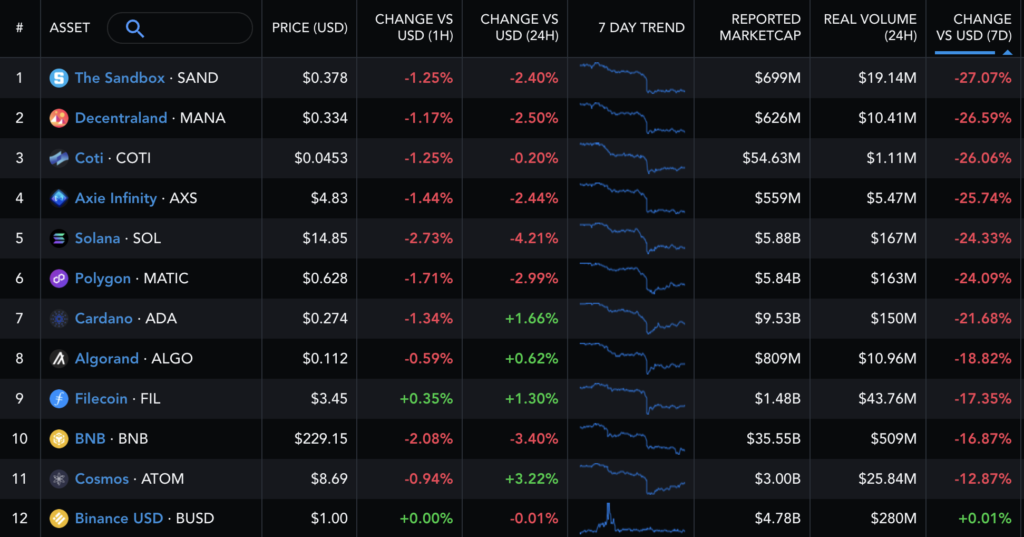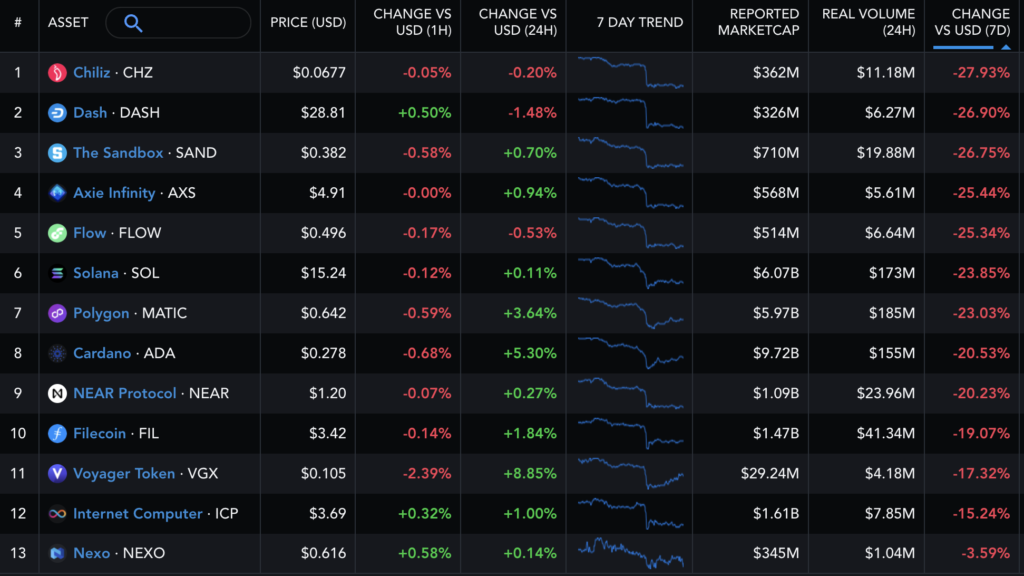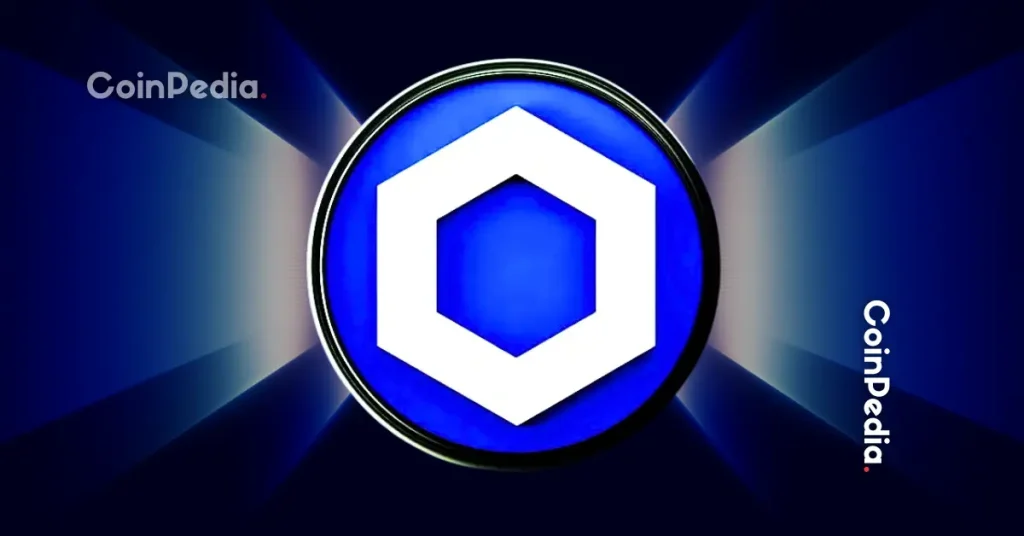
The U.S. Securities and Exchange Commission’s (SEC) lawsuit last week against two of the largest cryptocurrency exchanges has had a chilling effect on the 19 tokens listed in the complaint, making these projects a global threat. Legal experts say they may be forced to relocate to other areas. But at the same time, he said the ultimate impact is still unclear.
Meanwhile, the native tokens of well-known protocols in the industry have continued to languish, with all but one falling double digits over the past seven days.
“The lawsuit should come as no surprise to anyone who has followed the SEC’s recent strategy,” said Sean Farrell, head of digital asset research at data firm FundStrat. The SEC is trying to hold down on-ramps with a heavy legal burden and force them to move abroad.”
The SEC filed a lawsuit last week against Binance and Coinbase, accusing them of providing unregistered securities. The lawsuit highlights long-standing questions about whether crypto assets are “securities,” “commodities,” or something else.
early warning
The SEC issued a “Wells notice” to Coinbase in March, warning of potential lawsuits, and Coinbase responded to the notice in April. A Wells notice is a notice informing you that the SEC is planning enforcement action against a company. Binance has been under scrutiny by the SEC for years.
The lawsuit against Binance covers the platform’s own crypto asset, Binance Coin (BNB), and Binance-related stablecoin, Binance Dollar (BUSD).
Crypto analysts speculate that major U.S. exchanges are avoiding listing BNB for fear of conflict with regulators. “Exchanges probably consider BNB a security and not list it, given the centralization of the Binance network,” said one analyst.
Both lawsuits are against Solana (SOL), Cardano (ADA), Polygon (MATIC), Coti (COTI) and Algorand (ALGO), Filecoin (FIL), Cosmos (ATOM), Sandbox (SAND), Axy Infiniti (AXS), Decentraland (MANA), Voyager (VGX), Chillies (CHZ), NEAR, FLOW, DASH, NEXO, Internet Computer (ICP) and many more Tokens are equivalent to securities.
“These tokens are kind of in the air right now,” said Jesse Overall and Steve Gatti, attorneys at UK-based law firm Clifford Chance. states.
“Uncertainty and certain risks will arise in the United States for token-trading markets, other market participants, and possibly developers, pending judicial rulings,” the attorneys said. continued.
Overall and Gatti, however, noted that the SEC sued the exchange that listed the token, rather than going after the creator of the token.
American withdrawal
Some analysts believe that if the SEC wins, cryptocurrency exchanges will be forced to exit the US market.
“The question is whether this battle will go to court, and if so, judges will be more objective than the SEC in resolving the question of whether crypto assets are securities,” said industry officials. A lot of people think,” said SEC legal expert Ron Geffner.
“If the SEC wins, exchanges, issuers, and many service providers will have to reconsider whether they want to continue doing business in the United States, and if they do, they will have to reassess their past activities and future trading. Related to that, we need to decide whether we can comply with federal securities laws and how best to do that,” Gefner said.
Farrell, like Gefner, does not believe the token will continue to be listed in the US if the SEC wins. Farrell said he hopes Congress will eventually pass “a bill that creates a safe harbor for teams that launch tokens that are increasingly decentralized over a period of time.” Stated.
protocol reaction
In a statement, the Solana Foundation said it believes SOL is not a security.
“SOL is the native token of the Solana blockchain, a robust, open-source, community-based software project that relies on decentralized user and developer involvement to scale and evolve.”
Similarly, the NEAR Foundation last week said in a blog post that it disagreed with the SEC’s decision to include NEAR in the complaint, stating that “the Foundation does not believe it violated applicable U.S. securities laws.” “Foundations are regulated in Switzerland and the NEAR token is classified as a payment token (rather than as a security) under Swiss law,” he said.
Cardano developer IOG also refutes the SEC’s claim that its native token ADA is a security. “In no event is the ADA a securities under the Federal Securities Act, nor has it ever been a security,” IOG said in response to the lawsuit.
Polygon Labs said MATIC was “developed outside the United States,” was “deployed outside the United States,” and was “available to a wide range of people, but only in actions that are not directed to the United States at any time.” said.
However, popular trading app Robinhood announced on June 9 that it will delist ADA, SOL and MATIC on June 27. Other US exchanges listing these tokens have so far taken no action.
The lawsuits against Coinbase and Binance may trigger other exchanges to delist certain tokens to avoid similar lawsuits in the future.
According to Joshua Ashley Klayman, Head of Fintech Americas and Head of Blockchain and Digital Assets at law firm Linklaters LLP, “The SEC lawsuit against Binance and CZ[Binance’s CEO]is not just another. It will likely provide a roadmap for the allegations that trading platforms and market participants may face in the future.”
price
All 12 tokens mentioned in the complaint against Binance have fallen in the past week. Decentraland and Sandbox were among the hardest hit, dropping 26% and 27%, respectively.

 Tokens mentioned in complaint against Binance (Lyllah Ledesma/Messari)
Tokens mentioned in complaint against Binance (Lyllah Ledesma/Messari)Tokens mentioned in the complaint against Coinbase also dropped, with Chillies down nearly 30%.

 Tokens mentioned in the complaint against Coinbase (Lyllah Ledesma/Messari)
Tokens mentioned in the complaint against Coinbase (Lyllah Ledesma/Messari)Falling could be a buying opportunity, Farrell said.
“These lawsuits and subsequent declines may prompt a sell-off and create a solid rejoining point in the coming days.”
STORM managing partner Sheraz Ahmed said the short-term sell-off was expected and expects a recovery.
“Don’t forget that many of these tokens are associated with good blockchain projects. Coinbase’s share price dropped 13% and then quickly recovered to previous levels as if no lawsuit had been filed. We expect these tokens to recover strongly, as well.”
unknown territory
Overall and Gatti said it remains to be seen how developers and users will react to the lawsuit. Are you going to stop using the
“Because these assets are not traditional securities, it is fair to say that they are legally uncharted territory. There is little precedent that indicates how securities laws apply or how the assets should be treated pending a judicial decision on the matter,” said Overall and Gatti. It pointed out.
|Translation and editing: Akiko Yamaguchi, Takayuki Masuda
| Image: Nikhilesh De/CoinDesk
|Original: SEC’s Binance, Coinbase Suits Create Uncertain Future for Listed Tokens: Legal Experts
The post SEC sues two major exchanges, opacity in listed crypto assets: legal expert | CoinDesk JAPAN | Coin Desk Japan appeared first on Our Bitcoin News.

 2 years ago
123
2 years ago
123














 English (US) ·
English (US) ·